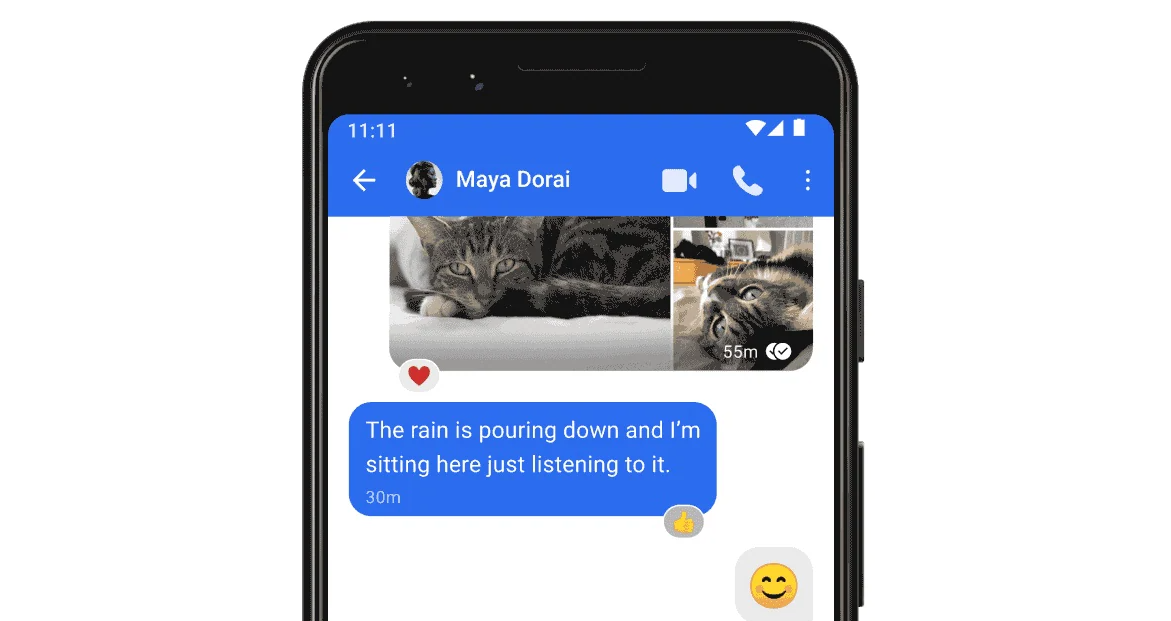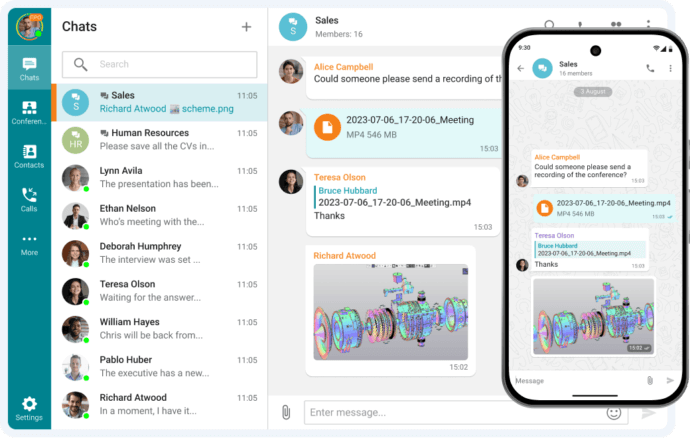Is Signal Safe? Encryption Behind Messaging Apps
Understanding the Encryption Behind Messaging Apps That Safeguard Private Texts
In modern times, when every minute is precious, messengers have become a necessity, providing millions of people worldwide with a way to connect with each other. When discussing the details of an important bargain or personal life, users tend to forget about their own security, using apps to transmit data not only about their location, but also about bank accounts. However, even secure words do not guarantee safety, as hackers are constantly finding new ways to intercept your data and exploit it against you.
That is why messenger vendors, who care about their users’ security, implement various cryptographic methods in their solutions. End-to-end encryption, based on generating a unique key for each sender and recipient, has proven to be the best in this regard. With this method of data processing, even the application’s technical specialists will not be able to access your data.
So, what methods does Signal use to protect your information?
Understanding What Signal is Exactly?
Signal is a cost-free and secure communication application that works on personal computers as well as mobile devices running iOS and Android.

The solution enables users to exchange messages in personal and group chats, share files, host video calls and online conferences. The most important and distinctive feature of Signal, which has made it so popular, is the confidentiality of messages, provided by end-to-end encryption.
Continuing the conversation about security, users can link the application to a third-party Google Voice service or use a temporary number instead of their personal one. At the same time, users of Mac OS and iOS devices can prevent calls from syncing with Signal, providing additional protection. This way, the messenger becomes also anonymous, making it one of the safest modern communication applications.
Signal offers a wide range of communication tools, such as engaging with other users in personal and group chats, and making audio and video calls with up to 40 participants. Confidential enthusiasts will appreciate the ability to send media files that will self-destruct after a predetermined amount of time. Users of the app also find the location-sharing feature extremely convenient, especially for those who travel frequently.
Now, let’s stop and discuss Signal’s security system in more detail.
End-to-end Encryption
As previously mentioned, Signal utilizes end-to-end encryption, provided by a proprietary protocol, as one of its main methods of protection. With this type of information processing, encryption and decryption occur on the devices of users. It is important to note that the data remains encrypted until it reaches its destination.
After encryption, the information looks like a set of unrelated characters. That is why, even if attackers intercept your message, they will not be able to gain anything from it. Images, videos, and other files that you want to share with your interlocutor are also encrypted.
Signal was ahead of many applications by creating its own protocol that implements end-to-end encryption. Large companies such as Microsoft, Google, and Facebook now use it to ensure the security of their solutions.
Signal Security Numbers
As another protective measure, Signal utilizes a security number. Each chat has a unique number, so you can confirm it with your interlocutor to ensure its authenticity.
It is especially important to be confident in another user when discussing confidential information.
If the interlocutor changes devices or reinstalls the application during the conversation, you will be immediately notified. This feature is specifically designed to protect against «Man-in-the-Middle» (MITM) attacks, in which a hacker disguises themselves as another user to obtain sensitive data.
In the event of a mismatch of security numbers or a notification of an unexpected device change, you should contact Signal Support to ensure your protection and prevent potential leaks.
Open-source
Signal has a decentralized model and open-source code, allowing any developer to modify the technology and share it. The main goal, as stated by the creators of the app, is to disseminate knowledge.
However, this does not mean that the Signal code is simplistic and unreliable. In October 2016, researchers from Queensland University of Technology, Oxford and McMaster University published a conclusion confirming the cryptographic security of the solution.
What Personal Data Does Signal Collect?
End-to-end encryption is a common feature of applications designed for secure messaging.
However, from a data security and risk management perspective, one major concern is the collection of metadata, such as IP addresses, contact lists, and conversation durations, which could still pose privacy risks.
In contrast to this non-confidential approach, Signal only stores the information necessary for the application’s operation. This includes mobile phone numbers, contact lists and randomly generated keys that ensure secure user interaction with each other.
Signal’s operation is also largely dependent on access to your address book, as it is through it that the application detects your potential conversation partners. The connection is made via secure servers, and the name information is automatically deleted immediately after the successful completion of the communication session.
Disadvantages Of Using Signal App
However, not everything is as perfect as it may seem at first glance: despite its ever-growing popularity, Signal has a very small user base. There is a high probability that you won’t find all your loved ones there unless you tell them about the application yourself.

Another drawback of Signal is that it is not possible to back up the message history. The application is decentralized and stores all data on the user’s device, so if the information is lost or deleted, it will be impossible to restore it.
It is also important to keep in mind that Signal does not support simultaneous use across multiple devices. Unlike popular apps, this solution connects to your main smartphone and stores all data without the possibility of synchronization. For example, even if you are using a Softbank eSIM to manage connectivity across phones, Signal will still remain locked to a single primary device. That is why users who are accustomed to constantly switching between multiple devices are disappointed with Signal.
As for the desktop version of the solution, there are also drawbacks. The fact is that Signal for PC is nothing more than an extension of a mobile app. This means that, for the desktop version to function correctly, your smartphone must be constantly connected to the internet.
We should also mention the difficulties associated with using the platform for business purposes. The security and privacy necessary for corporate communication become the cornerstone, in the case of Signal.
The fact is that the application does not allow you to create multi-user channels or groups, nor does it allow integration with third-party services.
Consequently, it is only natural that this solution cannot be used for customer support, which is a fundamental necessity for many large companies. That is why the heads of enterprises prefer to turn to Signal’s competitors, as they offer more opportunities and have a larger user base.
Furthermore, in 2022, the application was impacted by a major data breach due to the Twilio hack. Almost 2,000 users were affected by the cyberattack, as their phone numbers had been obtained by intruders. As a result, hackers registered new accounts and communicated with existing ones for the purpose of fraud.
Signal vs. Main Competitors
TrueConf
Thanks to its multi-level protection system, TrueConf is already being used by government and law enforcement agencies in many countries. TrueConf solution utilizes methods such as working on a single port, access control, and data storage on-premises, making potential data leaks almost impossible.

TrueConf not only enables safety messaging, but also audio and video conferencing with the ability to use collaboration tools, such as presentation showing, content sharing, remote desktop management, and much more.
Of particular interest to many are the advanced features based on Artificial Intelligence, which allow one to use TrueConf even in the most adverse conditions. This feature is provided by both smart noise reduction and background blurring, guaranteeing absolute privacy for communication.
Take your team communication to the next level with TrueConf!
A powerful self-hosted video conferencing solution for up to 1,000 users, available on desktop, mobile, and room systems.
The main reasons for WhatsApp’s popularity among businessmen are its ability to create working channels and its large user base. At the same time, you can make audio and video calls, and share various types of files, from images to documents.
WhatsApp employs end-to-end encryption for security, just like Signal. However, many potential users are confused by the amount of personal information that Meta collects without the ability to make a ban.
Telegram
Another application that is gaining increasing popularity among business representatives is Telegram. The application’s extensive capabilities, including not only audio and video communication but also channels with an unlimited number of subscribers, have already attracted a large number of regular users.
However, not everything is good with Telegram’s privacy, despite the apparent security of the solution. The application uses encryption at the transport layer, but it is not end-to-end. This means that Telegram IT specialists can read your messages at any time, regardless of the type of сhat. What’s even more worrying is the fact that the solution stores all user data on its servers, ultimately making privacy a mirage.
The Bottom Line. Is Signal right for you?
Signal stands out from other communication applications due to its wide range of features and reliable user data protection system. The main goal of the solution is to create a safe space for people to discuss any topic and share necessary files.
Thus, Signal will appeal to those users who want to communicate freely while feeling completely secure from any invasions of their personal data.
However, this solution is not suitable for businesses due to security-related restrictions. If you are looking for a solution for corporate interaction, then it is much better to turn to TrueConf.
About the Author
Nikita Dymenko is a technology writer and business development professional with more than six years of experience in the unified communications industry. Drawing on his background in product management, strategic growth, and business development at TrueConf, Nikita creates insightful articles and reviews about video conferencing platforms, collaboration tools, and enterprise messaging solutions.



Follow us on social networks